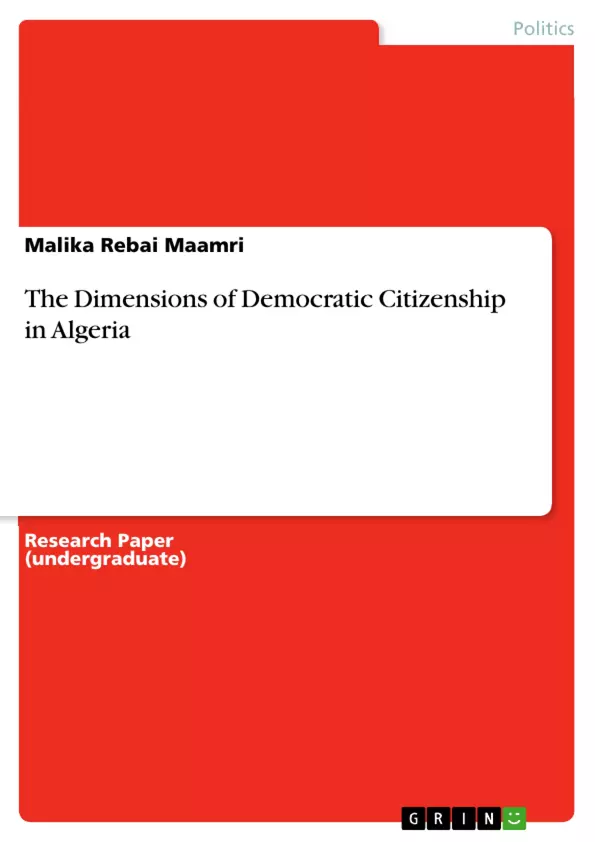By mid-twentieth century, citizenship and democracy had become a grand narrative about cohesion within society as well as about representation and misrepresentation within the modern state. Building a national identity proceeds hand-in-hand with the tasks of building a legitimate state and democratic institutions. In Africa for instance, the issues of democracy and citizenship have come to the centre stage. Many post-independent African governments have attempted to construct and strengthen the national consciousness of their citizens. Such policy formed part of broader projects meant to develop and promote national identity and the ties that bind them to one another as well as emphasize the bonds between state and citizens. However the blurring of such issues as participation, civil society, nation-state, citizenship and democracy, robbed as it were, the public sphere of its ‘ideal’ status, particularly with regard to its potential as an integrative force in society. While pervasive poverty constitutes the main hindrance to democracy in some countries, in others, the democratic deficit rests on other considerations.
Everyday experience of citizenship in post-colonial Algeria has revolved around a sense of what is lacking, the absence of entitlements, respect and dignity shattered by the French colonisers, a sense of longing for recognition, of being allowed to live with dignity, and of being treated as fully human. Integral to this process has been the development of a national identity out of the debris of colonialism. Today, state-society interaction in the country points towards both progressive and regressive democratisation.
Drawing on ideas from Habermas, Putnam, Dahl and others, this paper aims to explore the dimensions of democratic citizenship in Algeria. On the one hand, it will look at the strategies used by the decision-makers to revigorate and activate democratic governance. On the other hand, it will attempt to answer such questions as: 1) what are the new diverging and conflicting notions of (democratic) citizenship that are articulated in the public spheres? 2) What has happened to the stock of “social capital” in the course of democratisation in Algeria? What must the country do for an enduring democracy?
Inhaltsverzeichnis (Table of Contents)
- Contextualising the Struggle for Democracy in Africa
- The Democratic Agenda in the Arab World
- The Dynamics of Social Capital
- Building a National Democratic Society
Zielsetzung und Themenschwerpunkte (Objectives and Key Themes)
This paper aims to explore the dimensions of democratic citizenship in Algeria. It examines the strategies employed by decision-makers to activate democratic governance, particularly focusing on the diverging notions of citizenship articulated in public spheres and the impact of democratization on social capital within Algeria.
- The development of democratic citizenship in Algeria.
- The role of social capital in democratic governance.
- The impact of democratization on social capital in Algeria.
- The challenges and opportunities for democratic citizenship in the Algerian context.
Zusammenfassung der Kapitel (Chapter Summaries)
- Contextualising the Struggle for Democracy in Africa: This chapter provides a historical overview of the struggle for democracy in Africa, highlighting the challenges and setbacks faced by the continent in its quest for democratic governance. It examines the impact of colonialism, post-independence nation-building, and the role of international institutions on the development of democracy in Africa.
- The Democratic Agenda in the Arab World: This chapter explores the democratic agenda in the Arab World, highlighting the challenges and opportunities faced by the region in transitioning towards democratic governance. It examines the role of secularism, Islam, and political reforms in shaping the trajectory of democracy in the Arab world.
- The Dynamics of Social Capital: This chapter examines the concept of social capital and its relationship to democratic governance. It explores the different perspectives on social capital offered by scholars such as Putnam and Bourdieu, highlighting the potential benefits and drawbacks of social capital in fostering democratic change.
Schlüsselwörter (Keywords)
The paper focuses on democratic citizenship, social capital, democratization, and the Algerian context. It explores the relationship between social capital and democratic governance, analyzing the impact of democratization on social capital in Algeria. Key concepts include social embeddedness, trust, civic engagement, and the role of voluntary associations in fostering democratic change.
Frequently Asked Questions
What are the dimensions of democratic citizenship in Algeria?
Democratic citizenship in Algeria involves the struggle for entitlements, respect, and national identity emerging from the debris of colonialism.
What role does "social capital" play in Algeria's democratization?
Social capital—including trust and civic engagement—is crucial for fostering democratic change, though its development faces challenges in the post-colonial state.
How did colonialism impact Algerian citizenship?
French colonialism shattered the dignity and human recognition of Algerians, leading to a long-standing sense of "what is lacking" in their experience of citizenship.
What are the conflicting notions of citizenship in the public sphere?
The paper examines how different groups articulate diverging views on democracy, influenced by secularism, Islam, and political reforms.
What must Algeria do for an enduring democracy?
The study suggests that building legitimate institutions and strengthening national consciousness are essential tasks for progressive democratization.
- Citar trabajo
- Doctor Malika Rebai Maamri (Autor), 2014, The Dimensions of Democratic Citizenship in Algeria, Múnich, GRIN Verlag, https://www.grin.com/document/275320



